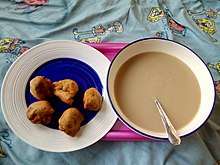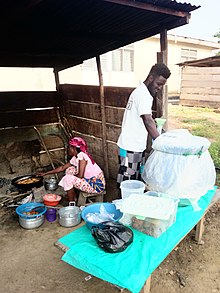Hausa koko
Hausa koko also known as spicy millet porridge, is a Ghanaian street food commonly eaten as breakfast meal. It can also be taken in late afternoon as snack.[1][2] It is made from millet with a few local spices added to give it a particular taste and color.[3] It is called Hausa koko because of the notion it was created in the Northern areas of Ghana. It is also common in the various communities in Ghana.[2]

It is usually accompanied by a Ghanaian fried bean bun called Koose, a spicey fried flour dumpling- Pinkaso or the Nigerian bean cake called Akara.[4]
Overview
Hausa koko is mostly found in West African countries and is credited to the Northern people, it is believed to have been first made by the Hausa among whom millet is a dietary staple. It is a very popular Ghanaian street food. On most mornings it is sold on street corners. Sugar, milk and groundnuts are sometimes added to give it a very delicious taste.[5]

Benefits
Hausa Koko is made from millet which contains Magnesium, Manganese, Tryptophan, Calcium, Fibre and Vitamin B.[2]
Preparation
- Wash and soak millet overnight
- Rinse and add ginger, black peppercorn, dried pepper and blend into a smooth mixture
- Stain twice with fine silk mesh, cover and let set for 5 hours
- Drain the liquid and set aside
- mix the residue with cold water or drained fermented water and set aside
- Bring about 500 ml water to a boil
- Take off the heat and place on a rack
- add the residue mixture and stir continuously to prevent lumps until the mixture thickens and coats the back of the ladle.
- Hausa koko is ready to serve.
- When ready to serve, pour into a bowl, add the desired amount of sugar and stir. For an added touch of luxury, pour in some evaporated milk and groundnut.
it can also be eaten with fried beans dough known as koose or bread.[6]
- "Try This Popular West African Street Food, Hausa Koko". The Spruce Eats. Retrieved 2019-06-22.
- "NEWS". miczd.gov.gh. Retrieved 2020-06-07.
- "5 nutritious Ghanaian breakfast options you overlook". www.ghanaweb.com. Retrieved 2019-06-22.
- "Hausa Koko". Mychopchop. Retrieved 2020-06-01.
- "How to prepare 'bofrot' and 'Hausa Koko'". www.pulse.com.gh. 2016-01-18. Retrieved 2019-06-22.
- "Recipe: How To Prepare Hausa Koko At Home". Modern Ghana. Retrieved 2019-06-29.